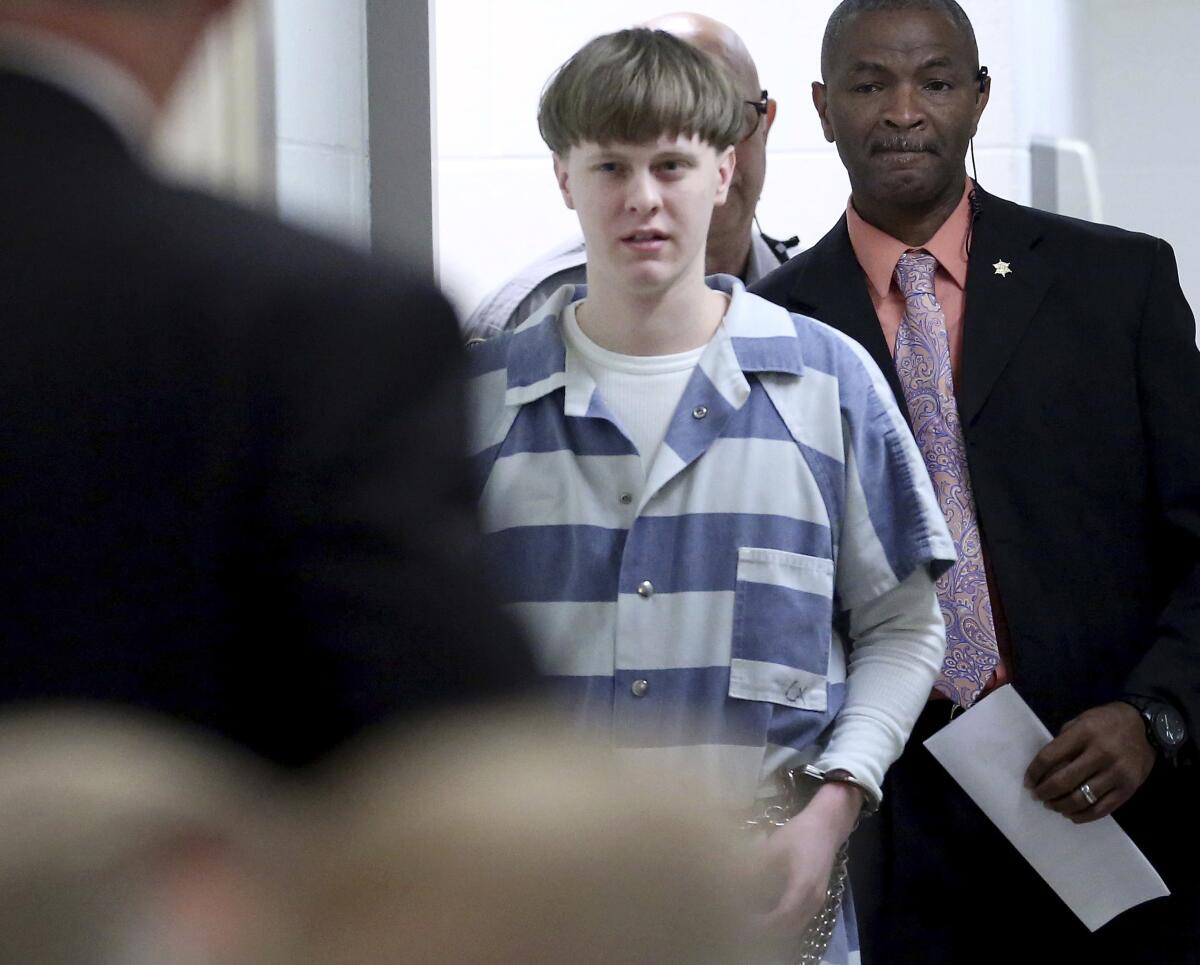Charleston shooter Dylann Roof’s lawyers say racist delusion showed incapacity

- Share via
COLUMBIA, S.C. — The man on federal death row for the racist slayings of nine members of a Black South Carolina congregation was wrongly allowed to represent himself during a critical phase of his trial, his attorneys argued Tuesday, saying Dylann Roof’s continuing “delusional belief” he’d be saved by white nationalists — but only if he kept mental health evidence out of his defense — should have shown his trial judge he wasn’t competent.
Before a three-judge panel, Roof’s attorneys argued that an appellate court should vacate his convictions and death sentence, or remand his case to court for a “proper competency evaluation,” something they argue wasn’t done during his trial in 2017.
That year, Roof became the first person in the U.S. sentenced to death for a federal hate crime. Authorities have said Roof opened fire during the closing prayer of a 2015 Bible study at Charleston’s Mother Emanuel AME Church, raining down dozens of bullets on those assembled. He was 21 years old at the time.
Representing himself for sentencing, Roof successfully prevented jurors from hearing evidence about his mental health, “under the delusion,” his attorneys have argued, that “he would be rescued from prison by white-nationalists — but only, bizarrely, if he kept his mental-impairments out of the public record.”
In that part of the trial, the self-avowed white supremacist neither fought for his life nor explained his actions, saying only that “anyone who hates anything in their mind has a good reason for it.”
The only reason Roof shirked his trial team to represent himself, appellate attorney Alexandra Yates argued Tuesday, was because the trial judge gave him a choice: either keep his attorneys and allow in mental health evidence, or get rid of them and keep it out.
”A defendant need not forgo the assistance of experienced attorneys, in order to remain master of his own defense, with the right to choose the objective of that defense,” Yates said.
U.S. District Judge Richard Gergel held two competency hearings: one before the start of Roof’s trial, and one before sentencing, to determine if Roof could act as his own attorney for that trial portion.
By excluding from that second hearing experts who would have argued against Roof’s competency, appellate attorney Sapna Mirchandani said Tuesday, the trial court “blinded itself” to whether Roof acted out of prejudice, or as a result of his mental illness.
In the second hearing, Ann O’Connell Adams of the U.S. Department of Justice argued, Gergel noted that he had reviewed prior evaluation of Roof, who she said acknowledged that his white supremacy rescue plan probably wouldn’t happen.
“Roof confirmed that he understood there was a high likelihood that he would be sentenced to death, and that the chance of being rescued was very small,” Adams said. “Roof was not making an irrational calculation that his best way to stay alive was to keep out the mental health mitigation evidence.”
All of the judges in the 4th U.S. Circuit Court of Appeals, which covers South Carolina, have recused themselves from hearing Roof’s appeal; one of their own, Judge Jay Richardson, prosecuted Roof’s case as an assistant U.S. Attorney. The panel considering Tuesday’s arguments comprised judges from several other appellate circuits.
Following his federal trial, Roof was given nine consecutive life sentences after pleading guilty in 2017 to state murder charges, leaving him to await execution in a federal prison and sparing his victims and their families the burden of a second trial.
Although President Biden — who as a candidate said he’d work to end federal executions — hasn’t spoken publicly in office about capital punishment, White House Press Secretary Jen Psaki said in March that he continues to have “grave concerns” about it.
Biden has connections to the case. As vice president, he attended the funeral for one of those slain, state Sen. Clementa Pinckney, who also pastored the congregation. During his 2020 presidential campaign, Biden frequently referenced the shooting, saying that a visit to Mother Emanuel helped him heal in the aftermath of the death of his son Beau.
If unsuccessful in his direct appeal, Roof could file what’s known as a 2255 appeal, or a request that the trial court review the constitutionality of his conviction and sentence. He could also petition the U.S. Supreme Court or seek a presidential pardon.
More to Read
Sign up for Essential California
The most important California stories and recommendations in your inbox every morning.
You may occasionally receive promotional content from the Los Angeles Times.









